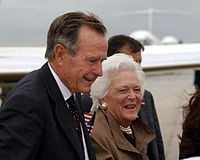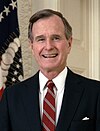
Troy McClure is a fictional character in the American animated series The Simpsons. He was originally voiced by Phil Hartman and first appeared in the second season episode "Homer vs. Lisa and the 8th Commandment". McClure is a washed-up actor who is usually shown doing low-level work, most notably hosting manipulative infomercials and questionable educational films. He appears as the main character in "A Fish Called Selma", in which he marries Selma Bouvier to aid his failing career and quash rumors about his personal life. McClure also hosts "The Simpsons 138th Episode Spectacular" and "The Simpsons Spin-Off Showcase".
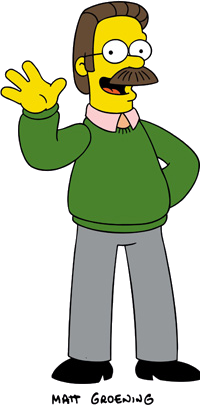
Nedward "Ned" Flanders Jr., commonly referred to by his surname, is a fictional character in the animated television series The Simpsons, voiced by Harry Shearer and first appearing in the series premiere episode "Simpsons Roasting on an Open Fire." He is the good-natured, cheery next-door neighbor to the Simpson family and is generally loathed by Homer Simpson, though there are numerous instances where the two are portrayed as good friends. A scrupulous and devout Evangelical Christian, he is among the friendliest and most compassionate of Springfield's residents and is generally considered a pillar of the Springfield community.

Josh Weinstein is an American television writer and producer, known for his work on the animated comedy series The Simpsons. Weinstein and Bill Oakley became best friends and writing partners at St. Albans School; Weinstein then attended Stanford University and was editor-in-chief of the Stanford Chaparral. He worked on several short-term media projects, including writing for the variety show Sunday Best, but was then unemployed for a long period.

"Homer's Enemy" is the twenty-third episode of the eighth season of the American animated television series The Simpsons. It was first broadcast on the Fox network in the United States on May 4, 1997. "Homer's Enemy" was directed by Jim Reardon and written by John Swartzwelder, based on an idea pitched by executive producer Bill Oakley.

"Homer's Phobia" is the fifteenth episode of the eighth season of the American animated television series The Simpsons. It first aired on the Fox network in the United States on February 16, 1997. In the episode, Homer dissociates himself from new family friend John after discovering that John is gay. Homer particularly fears that his son Bart will become gay if Bart spends time with John, so Homer decides to do hypermasculine activities with Bart, believing the activities will ensure Bart turns out to be heterosexual.

William Lloyd Oakley is an American television writer and producer, known for his work on the animated comedy series The Simpsons. Oakley and Josh Weinstein became best friends and writing partners at St. Albans School; Oakley then attended Harvard University and was Vice President of the Harvard Lampoon. He worked on several short-term media projects, including writing for the variety show Sunday Best, but was then unemployed for a long period.
Politics is a common theme in the animated sitcom The Simpsons, and this phenomenon has had some crossover with real American politics. The local politics of the fictional town Springfield feature prominently in many episodes, and character archetypes represent different political concepts within a community. The show satirizes ideas across the political spectrum, though overall it is described as having left-wing and anti-establishment bias. Politicians have been caricatured in many episodes of The Simpsons, including an episode following President George H. W. Bush in response to his public criticism of the show. References to the show also feature in real-world politics. The Simpsons addresses contemporary issues including substance abuse, the economy, education, environmentalism, gun politics, health politics, LGBT rights, immigration, and criminal justice. Episodes of the show have also caused international political dispute for its portrayal of foreign countries.
"$pringfield ", simply known as "$pringfield", is the tenth episode of the fifth season of the American animated television series The Simpsons, and the 91st episode overall. It originally aired on the Fox network in the United States on December 16, 1993. In the episode, Springfield legalizes gambling to revitalize its economy. Mr. Burns opens a casino where Homer is hired as a blackjack dealer. Marge develops a gambling addiction, Bart opens a casino in his tree house, and Burns' appearance and mental state deteriorate à la Howard Hughes.

"The Principal and the Pauper" is the second episode of the ninth season of the American animated television series The Simpsons and the 180th episode overall. It first aired on the Fox network in the United States on September 28, 1997. In the episode, Seymour Skinner begins to celebrate his twentieth anniversary as principal of Springfield Elementary School, when a man arrives claiming that Skinner has assumed his identity. Principal Skinner admits that his real name is Armin Tamzarian, and that he had thought the true Seymour Skinner, a friend from the Army, had died in the Vietnam War. Armin leaves Springfield, but is later persuaded to return as principal.
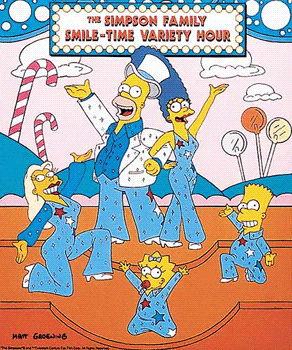
"The Simpsons Spin-Off Showcase" is the twenty-fourth and penultimate episode of the eighth season of the American animated television series The Simpsons. It originally aired on the Fox network in the United States on May 11, 1997. The episode centers on fictional pilot episodes of non-existent television series derived from The Simpsons, and is a parody of the tendency of networks to spin off characters from a hit series. As such it includes references to many different TV series. The first fictional spin-off is Chief Wiggum P.I., a cop-dramedy featuring Chief Wiggum and Seymour Skinner. The second is The Love-matic Grampa, a sitcom featuring Moe Szyslak who receives dating advice from Abraham Simpson, whose ghost is possessing a love testing machine. The final segment is The Simpson Family Smile-Time Variety Hour, a variety show featuring the Simpson family except for Lisa, who has been replaced.
"Home Sweet Homediddly-Dum-Doodily" is the third episode of the seventh season of the American animated television series The Simpsons. It originally aired on the Fox network in the United States on October 1, 1995. In the episode, the Simpson children are put in foster care at Ned and Maude Flanders' house. Homer and Marge are forced to attend a parenting class to get their children back.
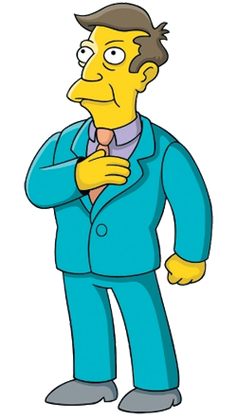
Principal Seymour Skinner is a recurring fictional character in the animated sitcom The Simpsons, who is voiced by Harry Shearer. He is the principal of Springfield Elementary School, which he struggles to control, and is constantly engaged in a battle against its inadequate resources, apathetic and bitter teachers, and often rowdy and unenthusiastic students, Bart Simpson being a standout example.
"Sideshow Bob Roberts" is the fifth episode of the sixth season of the American animated television series The Simpsons. It originally aired on the Fox network in the United States on October 9, 1994. Kelsey Grammer returns in his fourth major appearance as Sideshow Bob, who, in this episode, wins the Springfield mayoral election through electoral fraud to get revenge on Bart. The episode received a favorable reception in the media, including a positive mention in I Can't Believe It's a Bigger and Better Updated Unofficial Simpsons Guide and Green Bay Press-Gazette. A review in Press & Sun-Bulletin placed the episode as the seventh best of the series.
"Marge Gets a Job" is the seventh episode of the fourth season of the American animated television series The Simpsons. It originally aired on the Fox network in the United States on November 5, 1992. In this episode, Marge gets a job at the Springfield Nuclear Power Plant to pay for foundation repair at the Simpsons house. Mr. Burns develops a crush on Marge after seeing her at work and sexually harasses her. A subplot with Bart parallels the fable "The Boy Who Cried Wolf".
"Bart After Dark" is the fifth episode of the eighth season of the American animated television series The Simpsons. It originally aired on the Fox network in the United States on November 24, 1996. After accidentally breaking a stone gargoyle at a local house, Bart is forced to work there as punishment. He assumes it will be boring work, but is surprised when he learns that it is actually a burlesque house. Marge is horrified when she learns of the burlesque house, and resolves to have it shut down. The episode was directed by Dominic Polcino and written by Richard Appel.
Media is a recurring theme of satire on The Simpsons. The show is known for its satire of American popular culture and especially television culture, but has since its inception covered all types of media such as animation, journalism, commercials, comic books, movies, internet, and music. The series centers on a family and their life in a typical American town but the town of Springfield acts as a complete universe. The town features a vast array of media channels—from kids' television programming to local news, which enables the producers to make jokes about themselves and the entertainment industry.

The seventh season of the American animated television series The Simpsons originally aired on the Fox network between September 17, 1995, and May 19, 1996. The show runners for the seventh production season were Bill Oakley and Josh Weinstein who would executive produce 21 episodes this season. David Mirkin executive produced the remaining four, including two hold overs that were produced for the previous season. The season was nominated for two Primetime Emmy Awards, including Outstanding Animated Program and won an Annie Award for Best Animated Television Program. The DVD box set was released in Region 1 on December 13, 2005, Region 2 on January 30, 2006, and Region 4 on March 22, 2006. The set was released in two different forms: a Marge-shaped box and also a standard rectangular-shaped box in which the theme is a movie premiere.

The sixth season of the American animated television series The Simpsons originally aired on the Fox network between September 4, 1994, and May 21, 1995, and consists of 25 episodes. The Simpsons is an animated series about a working class family, which consists of Homer, Marge, Bart, Lisa, and Maggie. The show is set in the fictional city of Springfield, and lampoons American culture, society, television and many aspects of the human condition.

The third season of the American animated television series The Simpsons originally aired on the Fox network between September 19, 1991, and August 27, 1992. The showrunners for the third production season were Al Jean and Mike Reiss who executive produced 22 episodes for the season, while two other episodes were produced by James L. Brooks, Matt Groening, and Sam Simon, with it being produced by Gracie Films and 20th Century Fox Television. An additional episode, "Brother, Can You Spare Two Dimes?", aired on August 27, 1992, after the official end of the third season and is included on the Season 3 DVD set. Season three won six Primetime Emmy Awards for "Outstanding Voice-Over Performance" and also received a nomination for "Outstanding Animated Program" for the episode "Radio Bart". The complete season was released on DVD in Region 1 on August 26, 2003, Region 2 on October 6, 2003, and in Region 4 on October 22, 2003.

The Simpsons is an American animated television sitcom starring the animated Simpson family, which was created by Matt Groening. He conceived of the characters in the lobby of James L. Brooks's office and named them after his own family members, substituting "Bart" for his own name. The family debuted as shorts on The Tracey Ullman Show on April 19, 1987. After a three-season run, the sketch was developed into a half-hour prime time show called The Simpsons, which debuted on December 17, 1989. The show was an early hit for Fox, becoming the first Fox series to land in the top 30 ratings in a season (1990).
